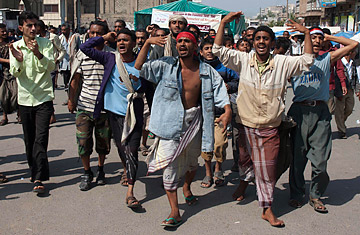
Antigovernment protesters shout slogans during a rally demanding the ouster of the whole regime of Yemen's outgoing President Ali Abdullah Saleh at Freedom Square in the southern city of Taiz on Dec. 11, 2011
(2 of 2)
That narrative of autocratic intransigence — not one of a rising rebel city — is what emerges a few miles across Taiz in the rundown district of Haseb, the center of the fighting. Over there blackened, bullet-pocked houses with blown-out windows overlook streets strewn with heaps of smoldering rubbish, hobbling stray dogs and cars and buses crumpled by fallen shells. "Only Saleh and his boys stand to benefit from this chaos," says Sheik Hamoud Saeed al-Mikhlafi, the man leading the armed rebellion in the city, beckoning to a water tank on his roof gnarled by an antiaircraft missile. "After signing the GCC [a reference to the Gulf Cooperation Council agreement that hopes to ease the Yemeni President out of power], we expected Saleh to travel to the U.S. for medical treatment, but instead he returned to Yemen and began setting fires. He is trying to provoke protesters to take up arms and bring an all-out war in Yemen, so that the regime can escape from meeting its commitments to the GCC initiative and he can forfeit the need to abdicate."
Al-Mikhlafi, a handsome man with graying hair and an iPhone and handgun clipped neatly to his belt, is one of a number of tribal sheiks from the surrounding countryside who sent armed fighters to attack government buildings, military installments and soldiers after government forces in May stormed through Freedom Square setting fire to and bulldozing tents. A member of the Islamist party and a cousin of the Nobel Peace Prize laureate Tawakkul Karman, he says that his men control one-third of Taiz and that if he wanted to he could take the rest of the city in a matter of days. "We are willing to withdraw from the city once the army stops attacking protesters," he says tossing his revolver deftly from one hand to the other. "We are guarding the revolution, we have no ambitions beyond that."
Wedged between these two warring factions are the thousand die-hard protesters camped out in their tents under the blistering Arabian sun. They too are bearing the brunt of the violence. Last Monday a 20-year-old woman died from severe blood loss after being shot in the chest by a plainclothes sniper poised on a nearby rooftop. But opinion among the inhabitants of Freedom Square remains divided over the role of the rebel gunmen, with some touting them as "heroes and protectors of the revolution" and others deriding them for derailing their peaceful protest.
"Saleh has two goals, to exhaust us and to divide us," said Abdul Kader al-Guneid, a doctor from Taiz and Twitter activist. "If we share a common enemy in Saleh, we would be foolish not to accept [the armed rebels'] help. Saleh wants to convince people this is a political crisis, a conflict between the tribes, not a revolution."
The coming months look to be decisive for Yemen. With the country's fate, at least for now, back in the hands of its politicians, all eyes are on the hodgepodge government of national unity sworn in on Saturday. But after months of political deadlock and stalling, patience on the ground is wafer thin. If the post-Saleh government does not act soon on its commitments — restructuring the fractured armed forces, drawing up a new constitution and reforming the electoral system — tensions could easily boil over again. With Saleh's aged Vice President, Abd al-Rab Mansur al-Hadi, set to be the only candidate, the upcoming elections in February are unlikely to quench the thirst of the demonstrators whose demands from the start have been broader and more fundamental.
For now, suspicion and apprehension reign over Taiz's Freedom Square. Protesters there say that even when Saleh relinquishes the presidency in February, he will still be in a position to pull the strings, unless members of his family are also removed from key positions in the security forces. Meanwhile al-Hadi, the man expected to lead Yemen through a two-year transition of reform, they say, is little more than a puppet of the President. Reinforcing their unrelenting calls for change, a new banner was strung across the square's entrance last week that reads "Al-Tariq Amaamunaa Tawiil," or "The Road Ahead of Us Is Long."
